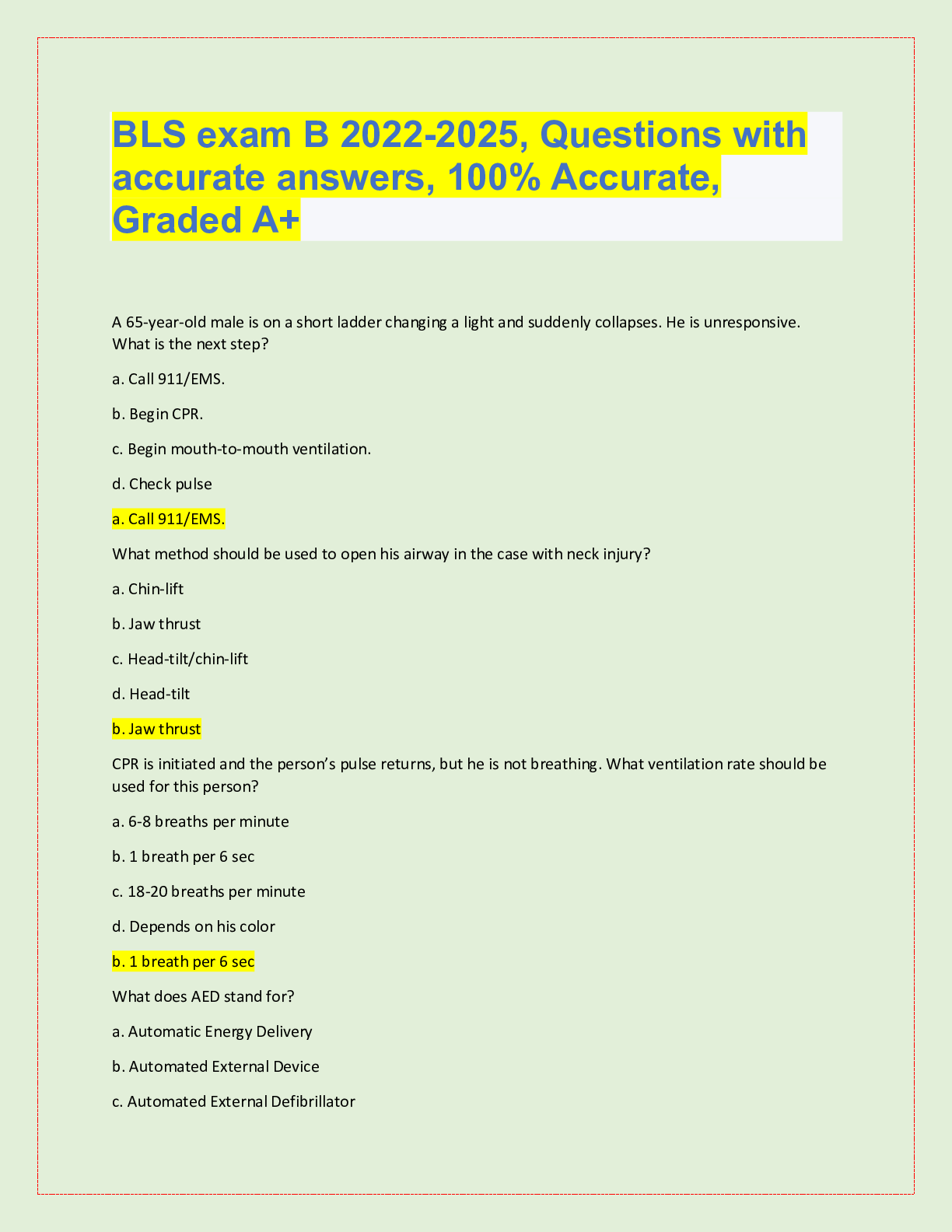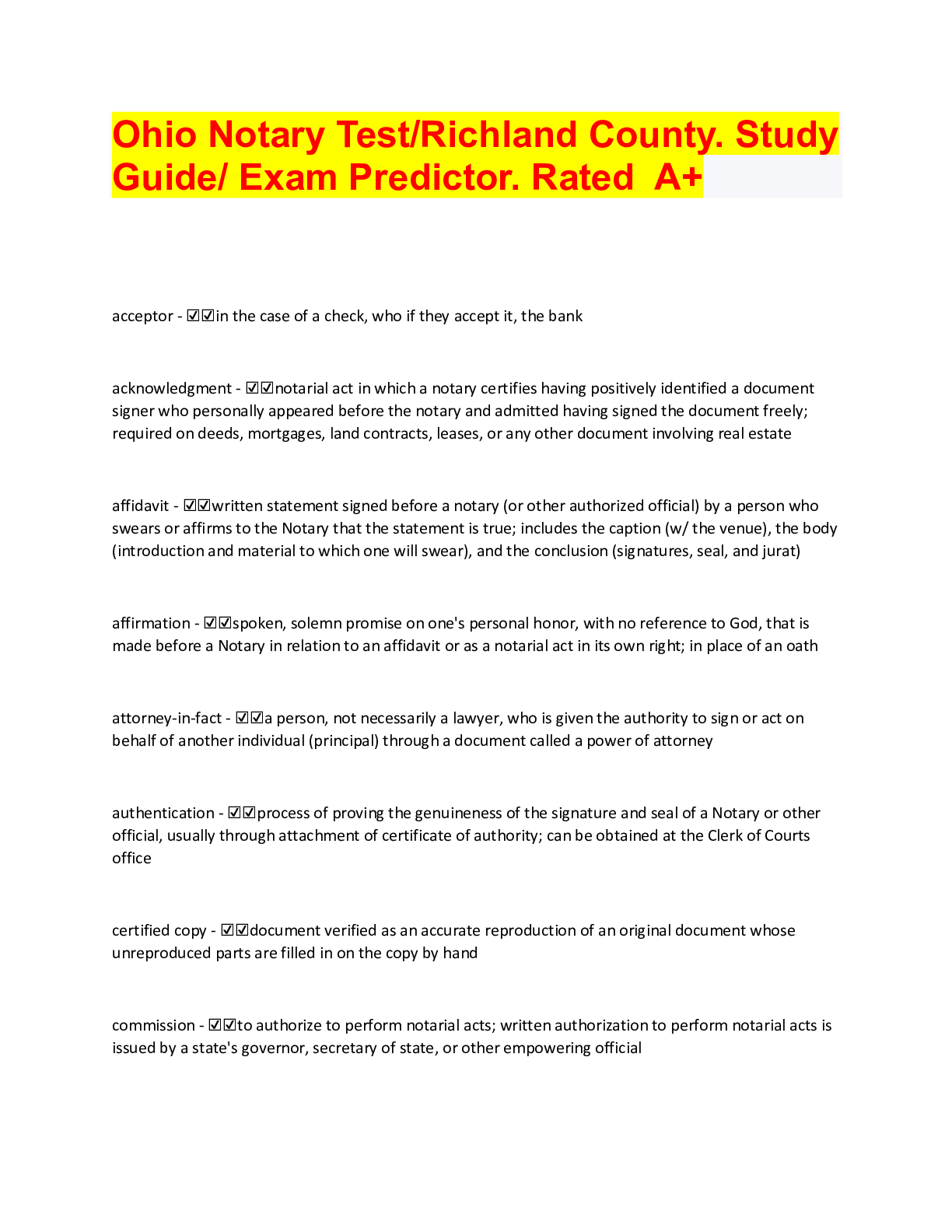Social Sciences > QUESTIONS & ANSWERS > IC&RC LCDC EXAM Domain IV (Professional and Ethical Development. Questions with accurate answers, r (All)
IC&RC LCDC EXAM Domain IV (Professional and Ethical Development. Questions with accurate answers, rated A 2023/2024 update
Document Content and Description Below
IC&RC LCDC EXAM Domain IV (Professional and Ethical Development. Questions with accurate answers, rated A 2023/2024 update The number of Ethical Principle in the code of ethics. - ✔✔-There a... re 12 principles in the code of ethics for ADC/LCDC 1) Nondiscrimination - ✔✔-The counselor must not discriminate against clients or professional based on race, religion, age, sex, handicaps, national origin, sexual orientation or economic condition. 2) Responsibility - ✔✔-The counselor must espouse objectivity and integrity and maintain the highest standards of service the counselor offers. a) the counselor as teacher must recognize the counselors primary obligation to help others acquire knowledge and skill in dealing with the disease of chemical dependency. B) The alcoholism and drug abuse counselor as practitioner must accept the professional challenge and responsibility deriving from the counselors work. 3) Competence - ✔✔-The counselor must recognize that the profession is founded on national standard of competency which promote the best interest of the society, the client, the counselor and the progression as a whole. The counselor must recognize the need for ongoing education as a component of professional competency. A) The counselor must prevent the practice of alcoholism and drug abuse counseling by unqualified or unauthorized persons. B) The counselor who is aware of unethical conduct or unprofessional modes of practice must report such violations to the appropriate certifying authority. C) The counselor must recognize boundaries and limitation of a counselors competencies and not offer services or use techniques outside of these professional competencies. D) The counselor must recognize the effect of impairment on professional techniques and must be willing to seek appropriate treatment for oneself or for a colleague. The counselor must support peer assistance programs in this respect. 4) Legal Standards and Moral Standards - ✔✔-The counselor must uphold the legal and accepted moral codes which pertain to professional conduct, legal and accepted moral codes in our society. A) The counselor must not claim either directly or by implication, professional qualifications/affiliations that the counselor does not possess. B) The counselor must not use an affiliation with TAAP for purposes that it is not intended for. C) The counselor must not associate with or permit the counselors name to be used in connection with any services or products in a way that is incorrect or misleading D) The counselor associated with the develop or promotion of books or other produces offered for commercial sale must be responsible for ensuring that such book or items are presented in a factual way. E) The counselor must obey civil and criminal laws and commit no act of moral turpitude of which would bring discredit to the profession. 5) Public Statements - ✔✔-The alcoholism and drug abuse counselor must respect the limits of present knowledge in public statements concerning alcoholism and other forms of drug addiction. a) The alcoholism and drug abuse counselor who represents the field of alcoholism and drug abuse counseling to clients, other professionals, or to the general public must report fairly and accurately the appropriate information. b) The alcoholism and drug abuse counselor must acknowledge and document materials and techniques used. c) The alcoholism and drug abuse counselor who conducts training in alcoholism and drug abuse counseling skills or techniques must indicate to the audience the requisite training/qualification to properly perform those skills and techniques. 6) Publication Credit - ✔✔-he alcoholism and drug abuse counselor must assign credit to all who have contributed to the published material and for the work upon which the publication is based. a) The alcoholism and drug abuse counselor must recognize joint authorship, major contributions of professional character made by several persons to a common project. The author who has made the principal contribution to a publication must be identified as a first listed. b) The alcoholism and drug abuse counselor must acknowledge in footnotes or an introductory statement minor contributions of a professional character, extensive clerical or similar assistance and other minor contributions. c) The alcoholism and drug abuse counselor must acknowledge, through specific citations, unpublished, as well as published, materials that have direct influences the research or writing. d) The alcoholism and drug abuse counselor who compiles and edits for publication the contributions of others must list oneself as editor, along with the names of those others who have contributed. 7) Client welfare - ✔✔-The alcoholism and drug abuse counselor must respect the integrity and protect the welfare of the person or group with whom the counselor is working. a) The alcoholism and drug abuse counselor must define for self and others the nature and direction of loyalties and responsibilities and keep all parties concerned informed of these commitments. b) The alcoholism and drug abuse counselor, in the presence of professional conflict, must be concerned primarily with the welfare of the client. The alcoholism and drug abuse counselor must terminate a counseling or consulting relationship when it is reasonably clear to the counselor that the client is not benefiting from it. c) The alcoholism and drug abuse counselor, in referral cases, must assume the responsibility for the client's welfare either by mutual agreement and/or by the client becoming engaged with another professional. In situations when a client refuses treatment, referral or recommendations, the alcoholism and drug abuse counselor must carefully consider the welfare of the client by weighing the benefits of continued treatment or termination and must act in the best interest of the client. d) The alcoholism and drug abuse counselor who asks a client to reveal personal information from other professionals or allows information to be divulged must inform the client of the nature of such transaction. The information released o [Show More]
Last updated: 2 years ago
Preview 1 out of 6 pages

Buy this document to get the full access instantly
Instant Download Access after purchase
Buy NowInstant download
We Accept:

Also available in bundle (1)

LCDC IC&RC exam Bundle, Top Questions and answers, verified.
LCDC IC&RC exam review 2017 test 1 Questions and answers, 100% Accurate, rated A. 26 exam Versions. APPROVED.
By Topmark 2 years ago
$40
16
Reviews( 0 )
$7.00
Can't find what you want? Try our AI powered Search
Document information
Connected school, study & course
About the document
Uploaded On
Mar 14, 2023
Number of pages
6
Written in
Additional information
This document has been written for:
Uploaded
Mar 14, 2023
Downloads
0
Views
125
























